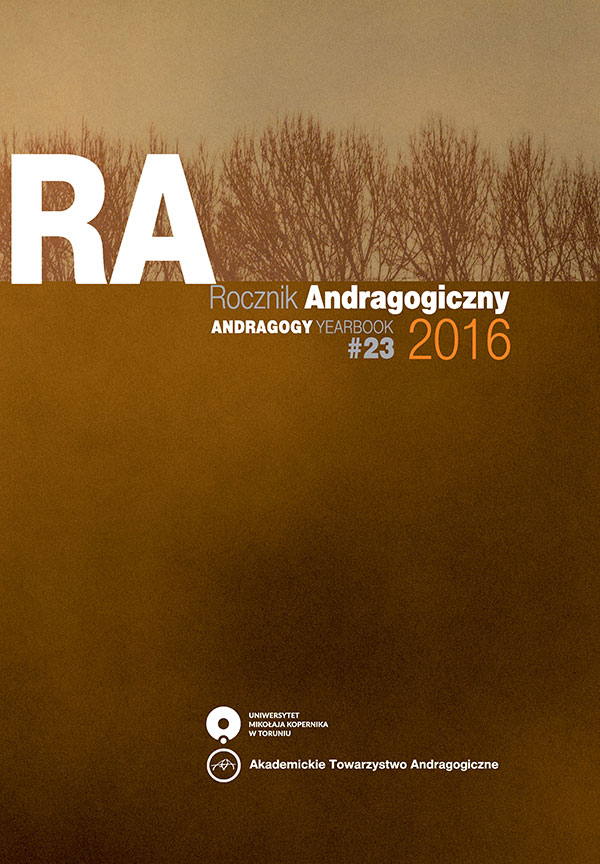Parentification correlates experienced in childhood and adolescence from the perspective of young adults
DOI:
https://doi.org/10.12775/RA.2016.010Keywords
parentification, role reversal, reversed parental role, filial responsibility, role confusion.Abstract
Parentification has also been known and studied as role reversal in family. Despite the fact that this concept entered scientific literature in the 1970’s, it has not received adequate attention and its causes and mechanisms have not been fully established. In Poland, parentification has been on the margins of psychological research and its prevalence, causes, and effects are unknown. Consequently, there is lack of practical guidelines for practitioners working with families in which role reversal might have taken place. The goal of this study is to gain insight into the prevalence, conditions, and types of parentification retrospectively reported by young adults reflecting on their family experiences in childhood and adolescence. The participants were 1045 students studying towards various teaching degrees at the University of Opole (Uniwersytet Opolski) and University of Szczecin (Uniwersytet Szczecinski). The results indicate that that parentification (or role reversal) correlates with selected sociodemographic variables, negative family life events, and with characteristics and patterns of behavior of the parents. Prevalence of parentification has also been revealed: over 70% of participants reported experiencing instrumental or emotional parentification whereas one fourth experienced a sense of injustice related to being parentified.References
Becker S., Aldridge J., Dearden C. (1998), Young careers and their families, Blackkwell Science, Oxford.
Boszormeny-Nagy I. J., Spark G. M. (1973), Invisible loyalties, [w:] Reciprocity intergenerational family therapy, Harper and Raw, Magerstown.
Byng-Hall J. (2002), Relieving parentified children’s burdens in families with in secure attachment patterns, [w:] Family process, 41 (3), 375–388.
Byng–Hall J. (2008), The significance of children fulfilling parental roles: Implications for family therapy, [w:] Journal of Family Therapy, 80, 147–162.
Creswell J. W. (2013), Projektowanie badań naukowych, Wydawnictwo Uniwersytetu Jagiellońskiego, Kraków.
Cohen J. (1988), Statistical power analysis for the behavioral sciences, Hillsdale, Erlbaum, 2nd edition, New York.
Early L., Cushway D. (2002), The parentified child, [w:] Clinical Child Psychology and Psychiatry, 7 (2), 163–178.
Hooper L. M. (2007), Expanding the Discussion Regarding Parentification and its Varied Outcomes: Implications for Mental Health Research and Practice, [w:] Journal of Men tal Health Counseling, 29 (4), 322–337.
Hooper L. M., De Coster J., White N., Vpltz M. L. (2011), Characterizing the Magnitude of the Relation between Self-Reported Childhood Parentification and Adult Psychopathology: A Meta-Analysis, [w:] Journal of Clinical Psychology, 67 (10), 1028–1043.
Hooper L. M., Dochler K. (2012), Assesing family caregiving: a comparison of three retrospective parentification measures, [w:] Journal of Martial and Family therapy, 38(4), 653 – 666.
Jurkovic G. J., (1991), Treatment of parental children and their families; Conceptual and technical issues, [w:] American Journal of Family Therapy, 19, 302–314.
Jurkovic G. J., Thirkield A. (1998), Parentification questionnaire, Department of Psychology, Georgia State University, University Plaza, (GA 30303) Atlanta.
Jurkovic G. J., Thirkield A., Morrell R. (2001), Parentification of Adult Children of Divorce: A Multidimensional Analysis, [w:] Journal of Youth and Adolescence, 30 (2), 245–257.
Liberska H., Matuszewska M. (2014), Modele funkcjonowania rodziny. Style wychowania, [w:] Janicka I., Liberska H., (red.) Psychologia rodziny, Wydawnictwo Naukowe PWN, Warszawa.
Macfie J., Brumariu L. E., Lyons-Ruth K. (2015), Parent-child role-confusion: A critical review of an emerging concept, [w:] Developmental Review 36, 34–57.
McMahon T. J., Luthar S.S. (2007), Defining characteristics and potentional consequnces of caretaking burden among children living in urban property, [w:] American Journal of Orthopsychiatry, 77, 267–281. Schier K. (2010), Gdy dziecko stresuje się rodzicem – odwrócona troska, czyli zjawisko parentyfikacji w rodzinie, [w:] Tryjarska B.(red.), Bliskość w rodzinie. Więzi w rodzinie a za- burzenia w dorosłości, Scholar, Warszawa.
Schier K. (2014), Dorosłe dzieci. Psychologiczna problematyka odwrócenia ról w rodzinie, Scholar, Warszawa.
Tutak-Goll M. (2016), Dorosłe dzieci, Gazeta Wyborcza 26.05.2016, Wysokie Obcasy nr 22 (881), 2.
Zukow-Goldring P. (2002), Sibling caregiving. Handbook of Parenting, Mahwah, 2nd edition, New York
Downloads
Published
How to Cite
Issue
Section
Stats
Number of views and downloads: 1574
Number of citations: 0



